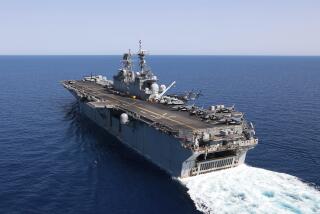Turkish Straits
- Share via
* In response to your article “New Shipping Rules Bring Turkey Into Conflict with Russia, Neighbors” (July 2):
Annually over 50,000 ships carry their passengers and cargo through the Turkish straits (Bosporus and Dardanelles) which connect the Black Sea to the Mediterranean via the Aegean. For the 10 million residents of Istanbul, the only city in the world which sits astride two continents, the Bosporus Strait is a connecting waterway between the city’s European and Asian sides. The oil tanker accident in March in the Bosporus, which caused at least 19 deaths and 10 missing and horrified the city’s inhabitants, is not the first but the latest example of the kind of the grave danger Istanbul is facing unless navigation is regulated according to the current conditions of the Bosporus Strait. There have been 40 big shipping accidents in and around the Bosporus since 1960, including the 1979 tanker collision which claimed the lives of 43 seamen. It is for this reason that the Turkish government decided to put into effect new regulations designed to manage safer passage.
The narrow Turkish straits are first and foremost a sea corridor, but not a passageway for oil and natural gas transportation. As long as thousands of tons of such inflammable and explosive materials are shipped in this heavy traffic, other vessels and human lives will remain in constant danger and disastrous accidents will be unavoidable. Therefore, the oil and natural gas from Central Asia and Azerbaijan should reach the sea via projected pipelines.
OGUZ CELIKKOL
Consul General of Turkey
Los Angeles
More to Read
Sign up for Essential California
The most important California stories and recommendations in your inbox every morning.
You may occasionally receive promotional content from the Los Angeles Times.













